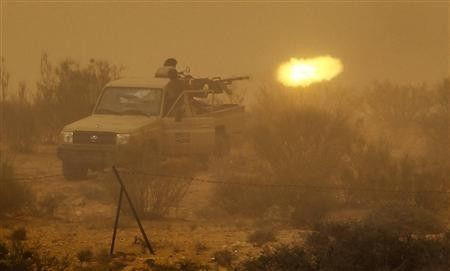Libyan Rebel Leadership Denies Talks with Gaddafi

Libyan rebels scorned reports of secret talks with Muammar Gaddafi's envoys Tuesday as their forces fought to secure gains and the United States said Gaddafi's days were numbered.
After 41 years of supreme power in his oil-rich desert state 69-year-old Gaddafi was isolated in the capital Tripoli, with reinvigorated rebel forces closing in from the West and South.
In Benghazi, the Transitional National Council, recognized by many of the NATO nations whose air power is supporting their assault, denied any kind of negotiation with Gaddafi to resolve the six-month-old conflict.
"The TNC would like to affirm that there are no negotiations either direct or indirect with the Gaddafi regime or with the special envoy of the United Nations," said leader Mustafa Abdel Jalil.
Gaddafi must step down and leave Libya, he said. "It is unthinkable to hold any negotiations or talks that disregard this basic principle."
In Washington, U.S. Defense Secretary Leon Panetta said Gaddafi's forces had been thrown back onto the defensive, and reports that a senior figure in the Libyan security apparatus had defected indicated the regime was cracking.
"Gaddafi's forces are weakened and this latest defection is another example of how weak they've gotten," Panetta said.
"I think the sense is that Gaddafi's days are numbered," Panetta said at event with Secretary of State Hillary Clinton.
At a news conference broadcast by Libyan state television, government spokesman Moussa Ibrahim dismissed reports that Gaddafi's forces were on the run but acknowledged fighting in several locations the rebels say they have already captured.
"Be aware of the media campaign which is trying to make the rebels bigger than they are," he told Libyan reporters. "Some foreign politicians have said this regime's days are finished and it has weeks left. They have been saying this for six months and we are still here."
Rebels fighting to topple Gaddafi seized two strategic towns near Tripoli over the past two days, cutting the city off from its supply lines and leaving the Libyan leader with a dwindling set of options if he is to stay in power.
But Gaddafi forces were mounting a counterattack in Zawiyah, west of Tripoli. Snipers in tall buildings were picking off rebel fighters, and salvos of rockets landed in the town.
A long-range Scud missile was used for the first time in the war, launched on Sunday near Gaddafi's now-isolated hometown of Sirte 500 km (310 miles) east of Tripoli.
It exploded in the open desert between the rebel-held towns of Brega and Ajdabiyah, injuring no one, said a U.S. official.
Analysts said this was an act of desperation. "It's an obvious sign that the regime's back is to the wall," said Shashank Joshi of Britain's Royal United Services Institute.
"Gaddafi troops are using his last gun. He's crazy," said Mohammad Zawawi, media director for rebel forces. "We're scared he'll use chemicals. That's why we're trying to end this war and we hope to end it with the least number of casualties."
Analysts say the rebel strategy is to isolate Tripoli and hope the government collapses, but they say it is also possible Gaddafi will opt to stage a last-ditch fight for the capital.
Rebels on the outskirts of Zawiyah said most of Gaddafi's forces had pulled out of the town, but left behind snipers who made it dangerous for the anti-Gaddafi fighters to move around.
A Reuters reporter saw six soldiers at a makeshift prison. They were blindfolded and made to kneel facing and rebels walked by, shouting at them and slapping them on the head.
"They were firing at us," said Abdel-Muiz Ramadan, 20, a rebel fighter. "We captured one of them and he gave us the location of the others."
Medical workers at one of the town's hospitals said 20 rebel fighters and civilians were killed on Monday.
(Additional reporting by Michael Georgy in Zawiyah, Libya, Phil Stewart in Washington, Missy Ryan in Tripoli, Ulf Laessing in Ras Jdir, Tunisia, Hamid Ould Ahmed in Algiers; William Maclean in London and Joseph Nasr in Berlin; Writing by Douglas Hamilton; Editing by Jon Boyle)
© Copyright Thomson Reuters 2024. All rights reserved.











